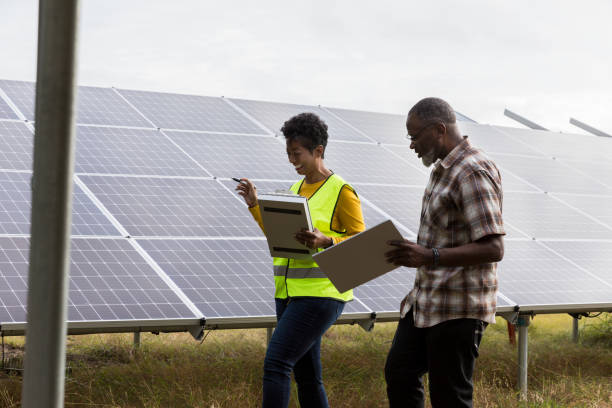Nigeria is Africa’s largest economy and most populous country, yet millions of its citizens live without reliable access to electricity. According to recent estimates, over 40% of the population is not connected to the national grid, while those with access face frequent power cuts and high generator costs. This reality has fueled a growing interest in renewable energy as a sustainable, cost-effective, and scalable solution to Nigeria’s power crisis.
“we believe renewable energy is not just an alternative — it is the future. By deploying solar, hybrid, and storage systems, we are helping households, businesses, and entire communities access cleaner and more reliable power.”
Why Renewable Energy Matters in Nigeria
-
Energy Access: Renewable energy, especially solar, offers off-grid and mini-grid solutions to rural communities left behind by the national grid.
-
Cost Savings: Unlike diesel or petrol generators, renewables reduce recurring fuel expenses and maintenance costs.
-
Environmental Impact: Solar and hybrid systems cut greenhouse gas emissions, aligning with global climate goals.
-
Resilience: Renewable energy systems with storage ensure stable power, reducing the effect of grid instability and outages.
In short, renewable energy holds the key to bridging Nigeria’s energy gap while advancing sustainable development.
Key Renewable Energy Solutions in Nigeria
1. Solar PV Plants
-
Rooftop and ground-mounted systems ranging from 50 kW to multi-MW capacities.
-
Ideal for commercial estates, schools, and industrial platforms.
2. Hybrid Systems & Battery Storage
-
Combining solar with diesel generators and battery storage for continuous supply.
-
Effective for manufacturing plants, hospitals, and estates where downtime is costly.
3. Mini-Grids
-
Providing rural electrification by powering villages, clinics, and small enterprises.
-
Often deployed through public-private partnerships or donor programs.
4. Energy Audits & Advisory
-
Identifying efficiency gaps, conducting financial modeling, and offering carbon accounting support.
Switchnet integrates these solutions based on client needs — from single-home systems to multi-megawatt community and industrial projects.
Opportunities in Nigeria’s Renewable Energy Sector
1. Massive Market Demand
Nigeria’s power demand far outstrips supply. With over 80 million people lacking reliable electricity, the market for renewable solutions is enormous.
2. Supportive Government Policies
The Federal Government, through bodies like NERC and REA, promotes renewable energy adoption via mini-grid regulations, incentives, and partnerships.
3. Falling Technology Costs
Solar panels, inverters, and batteries are becoming more affordable, making projects more financially viable.
4. Private Sector Participation
Banks, manufacturers, and estates are increasingly investing in renewable systems to reduce costs and improve sustainability.
5. International Climate Funding
Nigeria’s commitment to reducing carbon emissions has opened doors to international funding and donor support for renewable energy projects.
Challenges Facing Renewable Energy in Nigeria
1. High Initial Costs
Despite falling equipment prices, upfront capital costs remain a barrier for many households and small businesses.
2. Financing Gaps
Limited access to affordable financing and credit facilities slows large-scale adoption.
3. Policy and Regulatory Uncertainty
Inconsistent enforcement of policies can discourage investment in renewable projects.
4. Technical Capacity
A shortage of trained engineers and technicians affects installation quality and long-term maintenance.
5. Awareness & Trust
Many Nigerians still view renewable energy as experimental, leading to hesitancy in adoption.
The Role of Engineering Firms
Firms like Switchnet Engineering Technology play a critical role in bridging these gaps. Our approach includes:
-
Turnkey Project Delivery: From feasibility studies to installation and maintenance.
-
Hybrid Solutions: Custom designs that combine renewables with existing systems for reliability.
-
Capacity Building: Training local technicians and creating jobs in host communities.
-
Compliance: Aligning with NERC regulations, NEMSA standards, and ISO certifications.
-
Client Support: Offering energy audits, financial modeling, and long-term maintenance services.
By combining technical expertise with community engagement, we ensure renewable energy projects deliver both immediate impact and long-term sustainability.
Case Studies & Applications
-
Commercial Estate in Abuja: A solar-diesel hybrid system reduced generator use by 60%, saving the estate millions annually.
-
Rural Mini-Grid in Nasarawa State: Provided 24/7 electricity to a farming community, enabling cold storage for crops and powering small businesses.
-
Industrial Plant in Lagos: Battery storage integration improved power stability, reducing costly production downtime.
-
School Electrification Project: Solar PV installations in rural schools enabled computer-based learning and improved teaching conditions.
These examples demonstrate how renewable energy directly transforms lives, businesses, and communities.
Policy & Compliance Landscape
Nigeria’s renewable energy framework is guided by:
-
NERC Mini-Grid Regulation (2016): Encourages private sector participation in rural electrification.
-
Renewable Energy Master Plan (REMP): Sets national targets for renewable energy adoption.
-
Nationally Determined Contributions (NDCs): Nigeria’s climate commitments under the Paris Agreement.
-
ISO Standards: Ensuring quality, safety, and environmental responsibility in renewable energy projects.
Engineering companies that align with these standards provide clients with confidence and compliance.
Looking Ahead: The Road to Energy Transformation
The renewable energy sector in Nigeria is poised for growth, but realizing its full potential requires:
-
Increased Financing Models: More green bonds, concessional loans, and pay-as-you-go systems.
-
Technical Training: Expanding local expertise to support large-scale adoption.
-
Public-Private Collaboration: Partnerships that pool resources for wider impact.
-
Greater Public Awareness: Educating citizens on the benefits and reliability of renewable energy.
-
Sustainability Commitment: Ensuring projects are environmentally responsible and socially inclusive.
Switchnet is prepared to lead in this space by combining engineering depth, regulatory compliance, and innovative designs to deliver reliable renewable energy solutions across Nigeria.
Renewable energy is no longer optional for Nigeria, it is a necessity. It holds the power to transform communities, empower industries, and secure a sustainable future. Despite challenges, opportunities for growth are immense, and the right partnerships will accelerate progress. We are committed to driving this transformation by providing clean, reliable, and cost-effective energy solutions that serve homes, businesses, and communities. Together, we can build a brighter, greener future for Nigeria.





